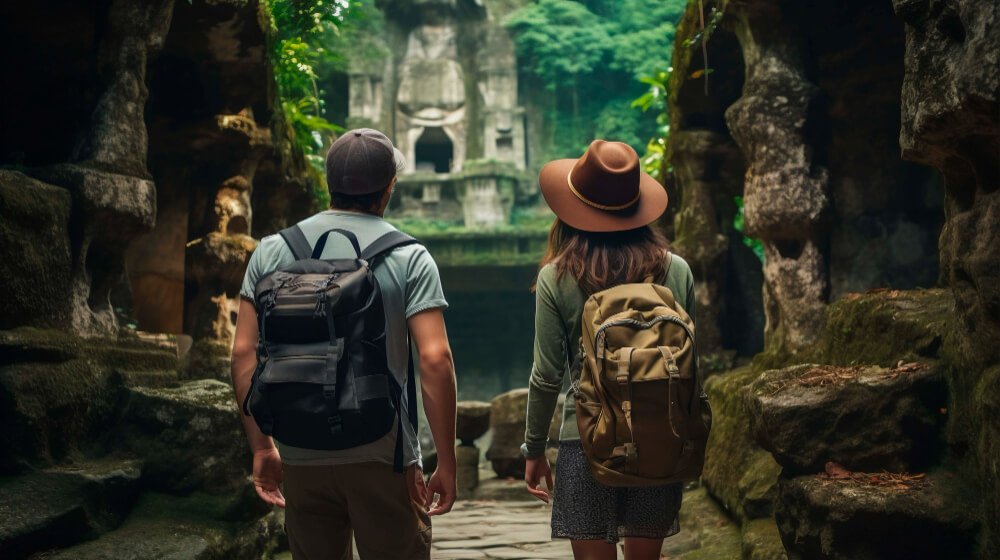The concept of sustainable travel is becoming vital as travelers recognize the impact their choices have on the world. Ecotourism stands as a beacon of hope—it allows us to explore stunning natural environments and fascinating cultures in a way that safeguards the planet and empowers the communities we visit. In this article, we’ll dive deeper into the meaning of “what is ecotourism,” its various forms, and why it’s an important choice for travelers seeking to make a difference.
What is Ecotourism? A Definition
The International Ecotourism Society (TIES) defines ecotourism as “responsible travel to natural areas that conserves the environment, sustains the well-being of the local people, and involves interpretation and education”. This definition emphasizes these essential aspects of ecotourism:
Environmental Responsibility
Prioritizing practices that minimize the negative impact on nature, such as reducing waste, respecting wildlife habitats, and promoting conservation efforts.
Support for Local Communities
Recognizing that tourism shouldn’t be extractive—it should empower communities by creating jobs, supporting local businesses, and encouraging a fair exchange of resources.
Education and Awareness
Ecotourism isn’t just about sightseeing; it provides opportunities for travelers to learn about local ecosystems, conservation challenges, and different cultures, fostering a greater respect for our planet and its people.
Types of Ecotourism
The ways to engage in ecotourism are diverse. Here are some popular examples:
Wildlife Watching
Safaris, birdwatching expeditions, and visits to nature reserves offer incredible encounters with wildlife while prioritizing animal welfare and supporting conservation initiatives.
Nature Hikes and Treks
Exploring breathtaking landscapes on foot, choosing well-maintained trails, and adhering to the “Leave No Trace” philosophy to ensure a minimal impact.
Cultural Immersion
Ecotourism ventures often involve homestays or interactions with indigenous communities, allowing for a deeper understanding of their traditions, knowledge, and connection to the land.
Volunteer Tourism
Travelers with specific skills or interests can participate in a variety of projects—from reforestation efforts and beach cleanups to community development initiatives and wildlife research.
Why is Ecotourism Important?
Ecotourism plays a vital role in addressing several interconnected global challenges, making it a crucial choice for environmentally and socially conscious travelers. Here’s a closer look at its key benefits:
Conservation of Biodiversity
Perhaps the most significant impact of ecotourism lies in its support for protecting precious wildlife and fragile ecosystems. Revenue generated from park fees, lodge stays, and guided tours often directly funds conservation projects, combating threats like poaching, habitat destruction, and species loss. By visiting protected areas, travelers signal the economic value of preserving these natural treasures.
Economic Empowerment of Local Communities
Ecotourism can be a powerful tool for poverty reduction, especially in rural and developing regions. It creates diverse job opportunities, from rangers and guides to cooks and craftspeople, providing alternative livelihoods and reducing reliance on environmentally destructive practices. Ecotourism also stimulates local markets, boosting incomes for farmers, artisans, and small business owners.
Educational Opportunities
Ecotourism goes beyond leisure; it fosters learning and awareness. Through interactions with knowledgeable guides, presentations at eco-lodges, and firsthand experiences in nature, travelers gain insights into environmental challenges, conservation solutions, and the rich cultural heritage of the places they visit. This newfound understanding can inspire long-term changes in lifestyle choices and active support for conservation initiatives.
Reduced Environmental Footprint
Ecotourism prioritizes sustainability. Eco-lodges often champion renewable energy, water conservation, waste reduction, and responsible food sourcing. By minimizing their impact, these establishments demonstrate sustainable practices and inspire travelers to adopt greener habits.
Enhanced Travel Experiences
For many travelers, ecotourism offers a richer and more meaningful experience than conventional tourism. Immersing oneself in nature, observing wildlife in their natural habitat, and connecting with local people creates lasting memories and fosters a deeper appreciation for the planet’s interconnectedness. Ecotourists often return home transformed, with a renewed commitment to sustainability and a desire to make a positive impact.
Countering Overtourism
Mass tourism can overwhelm popular destinations, straining natural resources and local infrastructure. Ecotourism often focuses on lesser-known areas, spreading the benefits of tourism more evenly and relieving pressure on hotspots. By choosing ecotourism options, travelers can help lessen the negative impacts of overtourism.
Promoting Cross-Cultural Understanding
Ecotourism can bridge cultural divides. When respectfully engaging with local communities, travelers can gain a deeper understanding of different perspectives, lifestyles, and traditional knowledge. This exchange of ideas fosters empathy, builds connections, and breaks down stereotypes.
Importantly, ecotourism highlights the inherent value of nature and the interconnectedness between environmental well-being, economic prosperity, and cultural respect. By supporting ecotourism, travelers become active participants in creating a more sustainable and equitable future for our planet and its people.
Principles of Ecotourism
Genuine ecotourism operators and responsible travelers understand that enjoying the beauty of our planet necessitates a commitment to certain principles. Here’s a closer look at each:
Minimize Negative Impacts
This principle encompasses a wide range of actions aimed at protecting the destinations visited. Ecotourists and operators carefully consider:
- Waste Management: Implementing strategies for recycling, composting, and minimizing single-use items.
- Wildlife Interaction: Maintaining a safe distance from animals, never feeding or disturbing them, and choosing tours that prioritize wildlife welfare.
- Resource Use: Employing renewable energy sources, conserving water, and mindfully using resources to minimize their impact.
- Trail Etiquette: Staying on designated trails to avoid damaging sensitive vegetation and preventing erosion.
Build Respect and Awareness
Ecotourism fosters a deeper understanding of nature and local cultures. This includes:
- Environmental Education: Gaining knowledge about the ecosystems visited, the threats they face, and ongoing conservation efforts.
- Cultural Sensitivity: Learning about local customs, traditions, and social norms, engaging in respectful interactions that avoid exploitation.
- Support for Conservation: Understanding how tourism can contribute to conservation projects and making informed choices that support these efforts.
Support Local Communities
Ecotourism aims to create a positive exchange between visitors and those who call the destination home. This involves:
- Local Economic Benefits: Prioritizing lodges and tour operators owned by locals, hiring local guides, and purchasing souvenirs directly from artisans.
- Community Participation: Encouraging collaboration with local communities in the planning and management of tourism, respecting their wishes for how tourism develops.
- Respectful Shopping: Practicing fair trade principles, ensuring craftspeople receive fair prices for their work, and avoiding products that harm wildlife.
Provide Financial Benefits for Conservation
A key aspect of ecotourism is ensuring tourism revenue directly supports the protection of natural areas. This can be achieved through:
- Park Entrance Fees: These fees are vital for funding park management, ranger salaries, and wildlife research.
- Conservation-Focused Lodges: Many eco-lodges partner with conservation organizations, allocating a portion of their profits to conservation projects.
- Donations and Carbon Offsets: Encouraging travelers to support local conservation initiatives or offset the emissions of their trip.
Advocate for Travelers’ Responsibility
Ecotourism extends beyond individual tours and destinations; it’s about shaping a sustainable travel mindset. This entails:
- Information Sharing: Spreading awareness about responsible tourism practices and encouraging others to make informed choices.
- Minimizing Impact at Home: Translating eco-conscious habits learned during travels into everyday life.
- Choosing Sustainable Operators: Thoroughly researching tour companies and accommodations to ensure their commitment to ecotourism principles.
By adhering to these principles, ecotourism aims to create a model where exploration and enjoyment of nature go hand-in-hand with the well-being of local communities and the protection of the planet we all share.
How to be an Ecotourist
Embracing ecotourism means being an active participant in protecting the places you visit and supporting the people who live there. Here’s a guide on how to put ecotourism principles into practice:
Research Destinations and Operators
- Seek out Sustainable Destinations: Explore less-crowded national parks, protected areas, and destinations known for their ecotourism initiatives.
- Verify Certifications: Look for companies with certifications from reputable organizations such as the Global Sustainable Tourism Council (GSTC), Rainforest Alliance, or local ecotourism associations.
- Read Reviews and Testimonials: See what other travelers say about a company’s commitment to sustainability, community benefits, and overall travel experience.
Support Local Businesses
- Choose Local Accommodations: Opt for small-scale, independently owned lodges, guesthouses, or homestays that are integrated into the community.
- Eat at Local Restaurants: Sample traditional cuisine, support local farmers, and experience a deeper level of cultural connection.
- Shop for Handcrafted Souvenirs: Buy directly from artisans or markets, ensuring fair compensation for their work and avoiding mass-produced items.
Respect Wildlife
- Observe from a Distance: Use binoculars or zoom lenses to observe wildlife without disturbing their natural behavior.
- Never Feed Wild Animals: It disrupts their natural foraging instincts and can make them dependent on humans.
- Avoid Exploitative Activities: Say no to elephant rides, captive animal shows, or any activities that put wildlife at risk. Support ethical sanctuaries and conservation centers instead.
Follow Leave No Trace principles
- Pack Out Your Trash: Whatever you bring in, bring out. Never litter, even if it’s biodegradable.
- Stay on Designated Trails: This helps prevent erosion and protects fragile vegetation in natural areas.
- Leave What You Find: Don’t take natural souvenirs such as rocks, flowers, or shells – they’re part of the ecosystem.
- Respect Campfires: Minimize campfire impacts and follow regulations regarding fire safety.
Offset Your Carbon Footprint
- Choose Sustainable Transportation: Opt for trains or buses when possible, minimize flights, and consider combining destinations efficiently to reduce long-haul travel.
- Support Carbon Offset Programs: Research reputable projects that invest in renewable energy or reforestation to compensate for the emissions of your journey.
Additional Considerations
- Pack Light and Smart: Reduce excess baggage and choose eco-friendly toiletries and reef-safe sunscreen.
- Conserve Water and Energy: Be mindful of your usage, even in eco-friendly establishments.
- Learn Basic Phrases: A few words in the local language go a long way in showing respect and building connections.
- Be Open-Minded: Embrace cultural differences, be patient, and remain open to learning new perspectives.
Remember, ecotourism is a continuous learning journey. By making conscious choices and striving to minimize your impact, you become an ambassador for responsible tourism, playing a part in preserving the beauty of our planet for generations to come.


